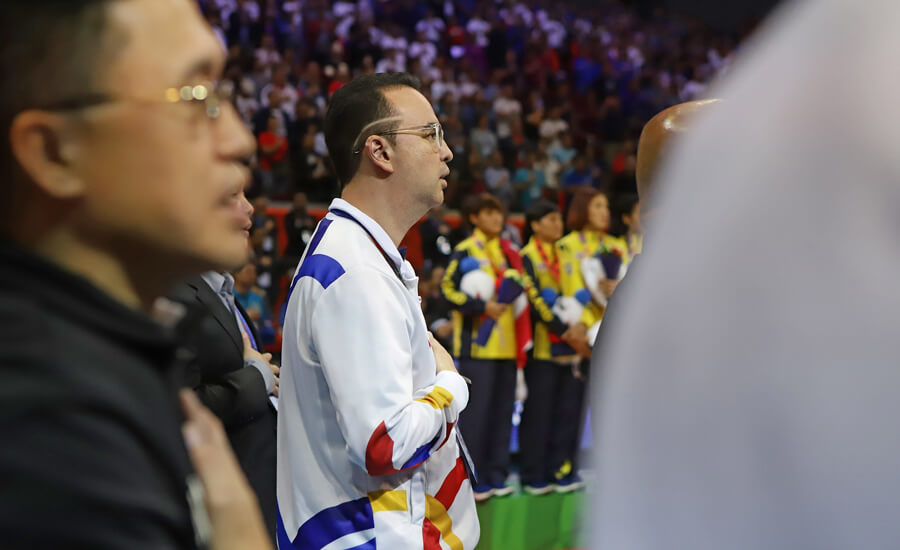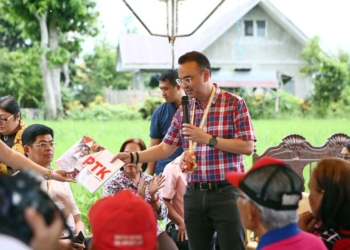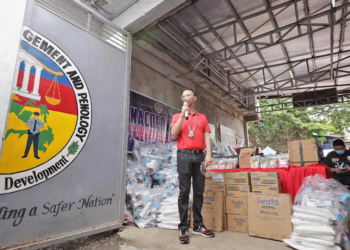
For former Speaker Alan Peter Cayetano, sports is an advocacy close to his heart because he believes that it teaches us more than just discipline, it imparts to us the importance of being fair in life. “Everything about life you can see in sports,” he says.
A lifelong basketball fan, Alan took on the challenging role of leading the Philippine Southeast Asian Games Organizing Committee (PHISGOC) at a crucial time in Philippine sports history when the country was set to stage the 2019 Southeast Asian Games. Even amid criticisms and roadblocks within and outside the sports community, he asserted his leadership to ensure that the sports stakeholders work together and support what would become the biggest sporting event in the history of the SEA games. It resulted in the resounding success not only of our hosting but also in the medals garnered by our athletes.
Alan tells us why sports continues to be one of his top advocacies, and how he plans to use his platform as a public official to push for a more holistic sports development plan.
Among all advocacies, why sports?
Everything about life you can see in sports. First, life is about your relationship with God and your relationship with other people. Sports is not always about winning; it’s about how you play the game. Sports teaches you how to deal with others fairly. Sports is not only good for your body, it’s also good for your mind. It’s good for your emotions. According to the Bible, “man does not live from bread alone but from everywhere that comes from God.” Many people don’t see that sports is actually one of the best teachers.
So when you say sports is a “teacher,” what does it teach specifically?
It is hard to teach patience, teamwork, honesty, etc. but in sports, these values are already taught. It is easy to say, “Don’t bully!” But in sports, you can actually learn that might is not always right… it’s more of − might is who is right.
Are you saying that sports has a beneficial impact on other aspects in life?
Yes, definitely! Look at education. You can educate a child in different ways but it is hard to teach teamwork when our school system rewards individual merits, like having one valedictorian. Sports, however, has the capability to teach teamwork. That one person can’t win alone.
Another example here is about the drug war. We all know that enforcement is very important, but rehabilitation and prevention are also essential. When we talk about prevention, just look at our athletes – they can’t eat salty or fatty food, they can’t smoke or indulge in heavy drinking, they have to sleep well, and most importantly, they can’t do drugs. You undergo this self-discipline because you know what it entails to excel at sports. So imagine this scenario… if more people are into sports, then there would be less people who are into drugs.
Sports, as you said, has many benefits to one’s life. How about our society and how can it uplift those who are experiencing poverty?
Sports, in reality, is one way out of poverty, especially if we promote other professional sports in our country aside from basketball. Basketball, especially professional basketball, is something that we all love and support, but we have to have that for all other sports. It is also the same with sports tourism – the country can earn billions of dollars because of sports tourism. A lot of industries – car rentals, catering, hotels, event organizers, etc. – can earn income from sports tourism events. So there are many advantages that sports can do for our society and the economy.
We are aware that the pandemic affected sports and how it cancelled multiple sporting events. What can you recommend to encourage our sports community?
Unfortunately, the pandemic has affected a lot of things, which includes the sports community. Adjustment is not that easy. For example, in online learning, the hardest to do would be P.E. so there needs to be a lot of adjustments.
It might also be a time to learn a new sport. For example, I’ve always been intrigued with chess. I learned a bit about chess during the lockdown. I play fast since I’m still learning. But the point is, there’s always time to learn something new, and sports really brings people together and makes you a better person.
You said earlier that sports is spiritual. What does that really mean?
Sports is relationship building. Even with God, it’s not about religion but our relationship with him. We all have different religions and I respect that. But you always have to ask yourself – Who is God in our life? And that can be answered by your relationship with God.
So when you say sports is relationship building, you mean to say sports can help improve how you deal with others?
Yes, correct. In the first place, you don’t do sports on your own. You can practice on your own, but you always have an ally. Or if you do individual sports, there’s always a competitor. So whether it’s the relationship with God or with others, sports hones your ability to communicate and to build a relationship.

As of the moment, what sports are you into?
Like any other Filipino, basketball. My dad loved basketball. My brother Ren has always been much, much better than all of us in basketball. I was thin when I was younger and not that great at playing, but I’ve always loved playing. As I got older, I didn’t improve but as my position in government went higher, even my competitors in basketball are delighted if I make a score. So in a sense, I became better when I got older.
I’ve always loved table tennis but my play is on-and-off. I also like to swim, although it’s quite lonely since you swim or jog alone… but let’s say in the beach or if with family members at a pool. I love beach volleyball with the family. Though I’m not good at it, I have fun playing with them.
As a child, have you ever dreamed of being an athlete since all of your siblings are athletes?
Yes, but my dreams were crushed early on since I wasn’t good at it. From a young age, I loved being with my dad and was fascinated with public service, getting to know people, how to deal with people, how to solve problems. So unlike all of my other siblings who are varsity members, I was the only one who was not built like an athlete. In fact, they were so surprised that I became very active in different sports associations or events, such as the SEA Games. But I guess because I embrace what sports is all about.
Speaking of sporting events, one of your major accomplishments was the SEA Games. What have you learned after that and what challenges did you face?
It was an eye-opener for me. There were many challenges but to single out one, I think the politics in our sports community is very much ingrained. To be fair, it’s not only in the Philippines that this happens. The politics in sports is worse and I observed that the election in sports is much worse than our government elections. Yet, we don’t give up, because in the end, it is the athletes that would suffer. If the sports leaders are quarreling and the management is in disarray, it is a great disservice to all our hardworking and passionate athletes.
So I think, right before COVID and now during COVID and after COVID, we must put our athletes front and center, and really provide them with the best facilities around the country.
Our athletes have said that they have changed for the better after the SEA Games. What are the plans for them?
We always mention “dugo at pawis.” “Pawis” means perspiration. But we all know that the combination of inspiration and perspiration goes together because even if you exercise and are really disciplined, your performance would still be affected if you have low morale. It’s also the other way – even if you are inspired but you are not exercising or training well, nothing will also happen.
We’ve said that sports is essential, but we don’t want to spend for it. We don’t want to build the facilities, we don’t want to fund our coaches and trainees, we don’t want to give the right allowances to our athletes. So the SEA Games was an opportunity to correct the wrong things and open the eyes of Filipinos to the real plight of our athletes.
“We need a viable and effective grassroots program so that, from an early age, someone who loves and excels in the game can be given the appropriate training and provided opportunities to become a future world-class athlete.”
After winning and giving Southeast Asia a world-class SEA Games, we want to continue that momentum. And we have three plans on the pipeline.
So these plans are for the future of Filipino athletes and the sports community?
Yes, and more than that. For example, first, there would be a National Sports Academy so that we have a high school that will focus on sports, find new talents, and provide scholarships to deserving student-athletes.
Second, we want to improve Clark further for it to become a national training site, and later, to become a regional hub for sports training and sports tourism.
Third, we are really evaluating the need for a Department of Sports that would look into our sports program from the grassroots going up. What we currently have is not feasible whether in academics or sports. We need a viable and effective grassroots program so that, from the earliest age, someone who learns to love the game and excels in it can be given the appropriate training, and provided the opportunities to become a future world-class athlete.





